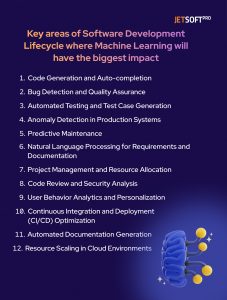In the ever-evolving landscape of technology startups, staying ahead of the competition is crucial. One of the most transformative tools in a startup’s arsenal is machine learning. This article explores how machine learning is empowering startups to create innovative and powerful software solutions that drive success.
The Role of Machine Learning in Startups
In today’s fast-paced and fiercely competitive tech startup ecosystem, staying ahead of the curve is essential for success. This is where machine learning (ML) emerges as a game-changer, revolutionizing the way startups develop software solutions. Let’s delve into the profound impact of ML on startups and how it fundamentally differs from traditional software development.
Machine learning is a subset of artificial intelligence that enables software applications to learn from data and improve over time without being explicitly programmed. Its significance in the startup world lies in its ability to analyze vast datasets, uncover patterns, and make predictions, thus helping startups make informed decisions, enhance user experiences, and streamline operations.
Unlike traditional software development, where rules and instructions are explicitly programmed, machine learning systems learn from data, adapting and evolving on their own. This adaptability is particularly valuable for startups navigating uncertain and dynamic markets.

Machine learning is poised to revolutionize various aspects of the software development lifecycle, offering efficiency, accuracy, and innovation. Here are the top areas where machine learning will have the most significant impact:
- Code Generation and Auto-completion:
- Why: Machine learning can analyze existing code repositories and generate code snippets, libraries, or even entire functions. It enhances developer productivity by offering smart auto-completion suggestions based on context, significantly speeding up coding tasks.
- Bug Detection and Quality Assurance:
- Why: ML algorithms can identify potential code defects and vulnerabilities by analyzing patterns and historical bug data. This leads to more robust and secure software, reducing the need for extensive manual testing and debugging.
- Automated Testing and Test Case Generation:
- Why: Machine learning can automate the creation of test cases and predict which parts of the codebase are most likely to fail. This accelerates testing cycles, improves coverage, and ensures software reliability.
- Anomaly Detection in Production Systems:
- Why: ML algorithms can continuously monitor production systems, detect anomalies, and trigger alerts or automated responses. This proactive approach reduces downtime and ensures system stability.
- Predictive Maintenance:
- Why: For applications with hardware components, ML can predict when components are likely to fail based on usage and sensor data. This enables preemptive maintenance, minimizing downtime and repair costs.
- Natural Language Processing for Requirements and Documentation:
- Why: ML-powered natural language processing (NLP) tools can help understand, organize, and extract valuable insights from text-based requirements and documentation. This aids in better project management and requirements analysis.
- Project Management and Resource Allocation:
- Why: Machine learning can optimize resource allocation by analyzing historical project data, team performance, and external factors. It helps in more accurate project planning and resource allocation.
- Code Review and Security Analysis:
- Why: ML can analyze code for security vulnerabilities and adherence to coding standards during code reviews. This reduces security risks and ensures code quality.
- User Behavior Analytics and Personalization:
- Why: ML-powered analytics can help software teams understand user behavior, preferences, and trends. This information can guide feature development and enhance user experiences through personalization.
- Continuous Integration and Deployment (CI/CD) Optimization:
- Why: ML can optimize CI/CD pipelines by identifying bottlenecks, predicting build failures, and recommending optimizations. This streamlines the development and deployment process, improving efficiency and reliability.
- Automated Documentation Generation:
- Why: ML can generate documentation from code, comments, and usage patterns. This ensures up-to-date and comprehensive documentation, making it easier for developers to understand and maintain the software.
- Resource Scaling in Cloud Environments:
- Why: Machine learning can analyze resource usage patterns in cloud environments and automatically scale resources up or down based on demand. This optimizes cost-efficiency and performance.
Identifying Market Opportunities
Machine learning algorithms excel at extracting valuable insights from massive datasets, allowing startups to gain a competitive edge. By analyzing market trends, understanding customer preferences, and monitoring competitors, startups can spot untapped opportunities and pivot their strategies accordingly.
According to McKinsey’s assessment, current technology is capable of fully automating less than 5% of occupations. Nevertheless, approximately 60% of occupations have the potential to automate 30% or more of their individual tasks and activities.
Startups like Airbnb and Uber harnessed the power of machine learning to identify niche markets and deliver innovative solutions. Airbnb, for instance, used ML algorithms to recommend personalized listings to users, while Uber optimized pricing and routes using predictive analytics.
Enhancing User Experience
Personalization is key to winning customer loyalty, and ML makes it possible by analyzing user behavior and preferences to offer tailored experiences. This leads to increased user engagement, higher conversion rates, and improved customer satisfaction.
Startups like Netflix and Spotify have mastered the art of recommendation systems powered by ML. These systems analyze user interactions to suggest content, creating a seamless and personalized experience. Additionally, chatbots, like those used by customer service startups, leverage natural language processing (NLP) to provide instant, helpful responses, enhancing user satisfaction.
Automating Operations
Automation is a significant benefit of ML. Startups can automate routine tasks such as data entry, customer inquiries, and even code testing, allowing their teams to focus on more strategic, creative, and value-added activities. In our article titled “Types Of Software Development Testing And Which To Choose”, you will be able to learn more about the differences between manual and automated code testing and how machine learning can help improve it.
Startups like UiPath, which specializes in robotic process automation (RPA), have empowered businesses to automate repetitive tasks using ML-driven bots. This has not only improved efficiency but also reduced operational costs significantly.
Predictive Analytics and Decision-Making
Predictive analytics, a core application of ML, enables startups to anticipate future trends, customer behavior, and market fluctuations. By leveraging historical data and sophisticated algorithms, startups can make informed, data-driven decisions.
Startups often operate in highly dynamic environments. ML can aid in risk assessment by identifying potential threats and vulnerabilities, optimize demand forecasting by analyzing market demand patterns, and streamline resource allocation for maximum efficiency.
Scalability and Growth
Startups are fueled by ambition and innovation, but their true test lies in their ability to scale operations efficiently and sustainably. Machine learning (ML) plays a pivotal role in helping startups achieve this and more. Let’s explore how ML empowers startups to scale and expand into new markets, unlocking unprecedented growth opportunities.
Scalability is a critical factor for startup success. ML automates processes, optimizes resource allocation, and adapts to changing circumstances, allowing startups to handle increased demand and growth without proportionally increasing their workforce or costs.
Expanding into new markets and reaching different customer segments can be daunting. ML provides insights into market trends, customer preferences, and cultural nuances, enabling startups to tailor their offerings effectively. This adaptability accelerates market penetration and diversification.
Overcoming Challenges
Despite the transformative potential of ML, startups face specific challenges when implementing it. Addressing these hurdles is crucial to harnessing its benefits.
Data quality is the foundation of effective ML. Startups often struggle with gathering, cleaning, and maintaining high-quality data. Additionally, finding and retaining ML talent can be a daunting task, given the fierce competition for skilled professionals.
Startups can address data quality issues by investing in data collection and cleaning tools. Collaborating with data experts or consulting firms can help ensure data accuracy. In terms of talent acquisition, startups can cultivate in-house expertise by providing training and networking opportunities. Alternatively, they can leverage third-party service providers or freelance experts.
Case studies of startups like Grammarly, which leveraged ML for grammar and style checking, and Stitch Fix, which used ML for personalized fashion recommendations, showcase how ML can drive innovation and growth.
These startups have not only improved user experiences but also achieved substantial revenue growth through ML-driven solutions. Grammarly, for instance, saw a significant increase in user engagement and subscription revenues, while Stitch Fix reported a boost in customer satisfaction and loyalty.
Future Prospects
The field of machine learning is continually evolving, and startups need to stay ahead of the curve to maintain their competitive edge.
Startups should keep an eye on trends like federated learning, responsible AI, and edge computing, which can open up new opportunities for innovation and growth. If you’re interested in exploring how AI technologies can be integrated to improve software development, we invite you to read our article: Can AI replace software developers?
To thrive in the dynamic tech landscape, startups must foster a culture of innovation. Continuous experimentation, research, and adaptation to emerging ML trends will be key to long-term success.

